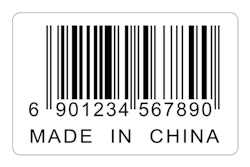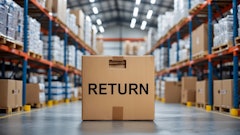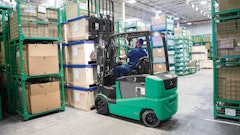
By Stefan Busselot
As global supply chains grow in complexity, regulatory and customs authorities are becoming more ambitious in implementing electronic customs filing processes to improve security and speed processes. While many of these filing requirements have similarities, additional complexities need to be considered when crossing multiple jurisdictional boundaries — an especially challenging issue when dealing with European Union (EU) compliance demands.
As with other regions, the EU is introducing customs compliance regulations to standardize and automate its customs filings process. As the world's most important exporter and second most important importer, according to a 2008 EU Commission report, the EU's efforts to address the security and automation of trade shipments through electronic customs initiatives will have a significant impact on exporters and importers across the global supply chain.
Specifically, as of January 1, the EU's Import Control System (ICS) and Export Control System (ECS) customs manifest filing processes and requirements take effect. The burden of supplying advanced shipment information for products en route to the EU, or going to other destinations via the EU, will now rest with the carriers. This transition presents process change requirements for non-EU exporters and carriers alike.
While the focus is on the carriers to meet documentation requirements, exporters, importers and forwarders must equally make tangible efforts to understand the challenges those carriers face in light of the ICS legislation. For exporters and importers, not understanding the requirements and/or working with carriers that are not technologically capable of handling these new complexities could potentially lead to significant delays, increased container inspections, additional costs and lost revenue opportunities.
The EU's ICS and ECS filing processes and requirements are expected to be comparable to initiatives in the US and Canada. However, there is one significant difference that supply chain partners must consider: Each of the EU's 27 member states has its own filing requirements, communications platform and language of choice. To ensure the continuity of goods delivery when these new filing regulations come into effect, supply chain partners will need to understand and work with specifications for all 27 member states.
ICS Requirements Explained
As of the final January 1, 2011, transition date, it will be mandatory for carriers to provide EU customs authorities with advance electronic information on shipments in transit through the EU or destined for an EU member state for security checks and profiling. This new approach will enable customs authorities to transition from a post-clearing model to a pre-arrival one.
Carriers bringing shipments from non-EU destinations into the EU will be required to provide Entry Summary Declaration (ENS) information to the customs office of the first EU port of entry. The responsibility for filing the ENS lies with the carrier or a designated third party under the carrier's direction.
Pre-arrival information will be used by EU customs authorities to conduct a risk assessment of the transaction based on pre-established criteria, including commodity, point of origin and trading partners. The information that will be required in the ENS includes:
- Unique consignment reference, container numbers, seal numbers, goods description, shipping marks and commodity codes;
- The names of the consigner, consignee, carrier, person filing or lodging the ENS;
- Identification of the consignee and authorized economic operator (AEO) status.
The timelines for ENS compliance filing vary depending on the mode of transportation. A number of member states have implemented ICS systems, while others are still to complete deployment. Time limits based on mode of transport and types of cargo are as follows:
- Deep sea container transport: 24 hours before loading at the port of departure;
- Bulk/break bulk: 4 hours before arrival at the first EU port;
- Short sea transport: 2 hours before arrival at the first EU port;
- Short haul flights: at least by the time of the actual takeoff of the aircraft;
- Long haul flights: at least 4 hours before arrival at the first EU airport;
- Road traffic: 1 hour before arrival at the first EU customs office;
- Inland waterways and rail: 2 hours before arrival at the first EU customs office.
Once the ICS requirements are in effect, failure to comply will lead to delays, rejection of the cargo upon receipt in the EU or prior to shipment (in the case of deep sea transport), and, in some cases, penalties set by the individual member states. This is very much in line with compliance enforcement policies in the United States, China and Canada.
Embracing a Single-source Approach
To prevent delays at the EU border, complete and accurate information must be provided about the shipment in a timely manner. Collecting, reusing and sharing information electronically throughout the supply chain will become increasingly more important to streamlining this new process and complying with the new legislation. Among other issues, this will demand strong integration capabilities on a global scale.
The biggest challenge faced by supply chain participants, however, is getting access to accurate data on a timely basis. In many cases, carriers must work with partial data and manual processes; or they may have to rely on partners to supply the additional information they need to complete their filings (e.g., AEO status, commodity and dangerous goods codes, consignors, contents, etc.).
Adding to the challenge of meeting ICS requirements, each EU country uses different data formats, business logic, communication protocols and certification processes. To overcome the disparate systems and processes, supply chain partners need a cost-effective means to integrate, collect and transmit data efficiently and accurately. This demands sophisticated, globally based technology solutions that can address all member state requirements and easily convert and distribute master data to any required format prior to distributing the ENS.
Contrary to what one might think, this capability is not beyond existing IT budgets. Rather than working with local providers developing solutions for individual member states, partners can achieve a seamless exchange of information on a global level with brokers, shippers and regulatory authorities around the world by using a centralized, global filing system that automatically converts and distributes master data to any agreed format, regardless of the member state, communication platform and mode of transport. This will enable users to meet ICS requirements prior to sending the ENS to the respective authorities and allow exporters, importers and forwarders to keep pace with supply chain activities in real time, while also improving data quality and integration. All these factors will help carriers avoid potential delays, mitigate risks and stay compliant.
With ICS deadlines around the corner, carriers must have the resources in place to meet increasingly demanding compliance requirements. A single point of access to a global system for managing multiple data entry and filing requirements will become essential for ensuring compliance today and into the future.
About the Author: Stefan Busselot is product manager, EU import security and declarations at Descartes Systems Group, where he has been working on product suite direction, including functional analysis and product management of several solutions of the customs portfolio. Busselot has been developing and implementing customs applications handling customs declarations (import, export and transit) and customs warehouse management for several European countries. He is considered a customs systems and solution expert in Europe. More information on Descartes Systems Group is available at www.descartes.com.














![Pros To Know 2026 [color]](https://img.sdcexec.com/mindful/acbm/workspaces/default/uploads/2025/08/prostoknow-2026-color.mduFvhpgMk.png?ar=16%3A9&auto=format%2Ccompress&bg=fff&fill-color=fff&fit=fill&h=135&q=70&w=240)
